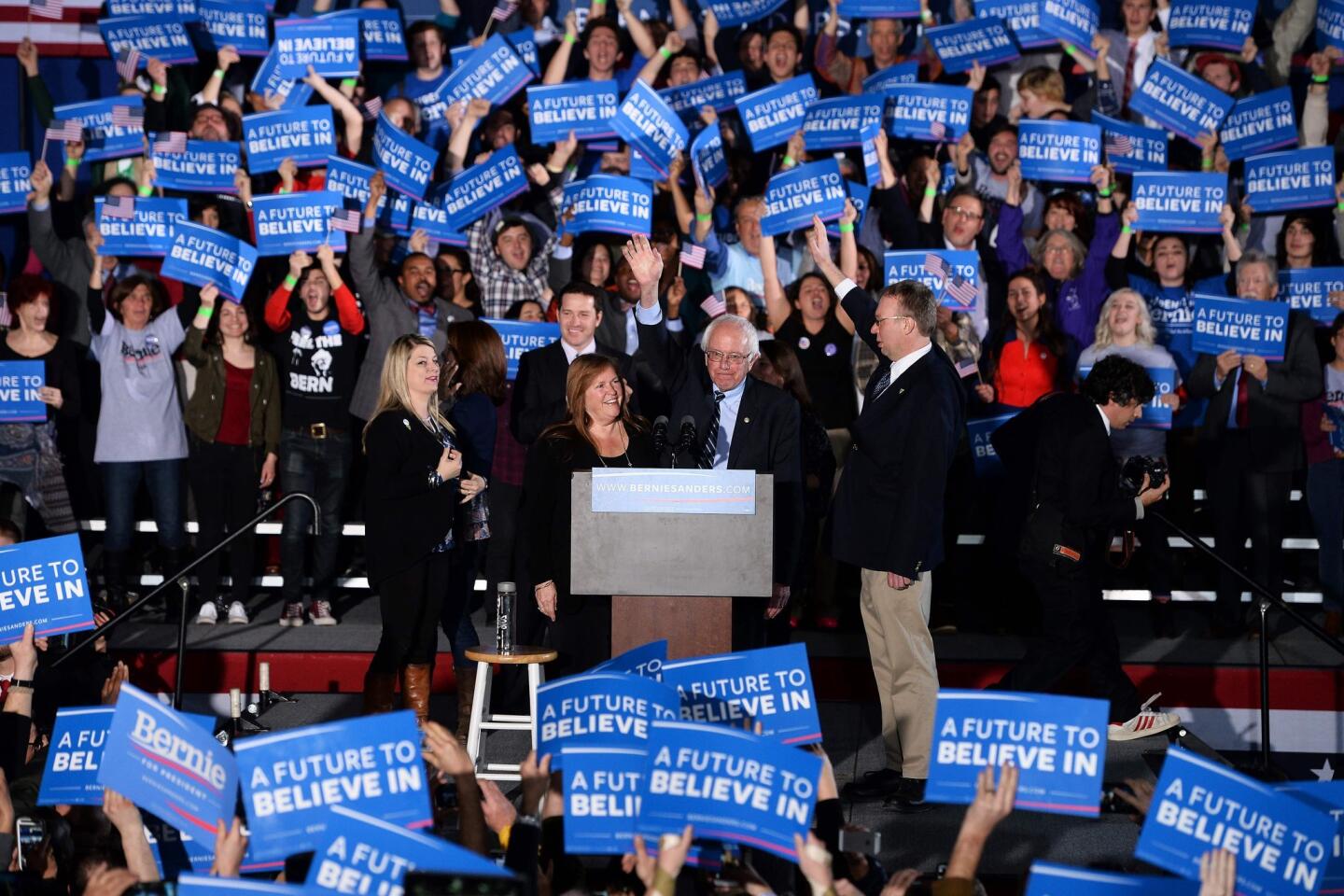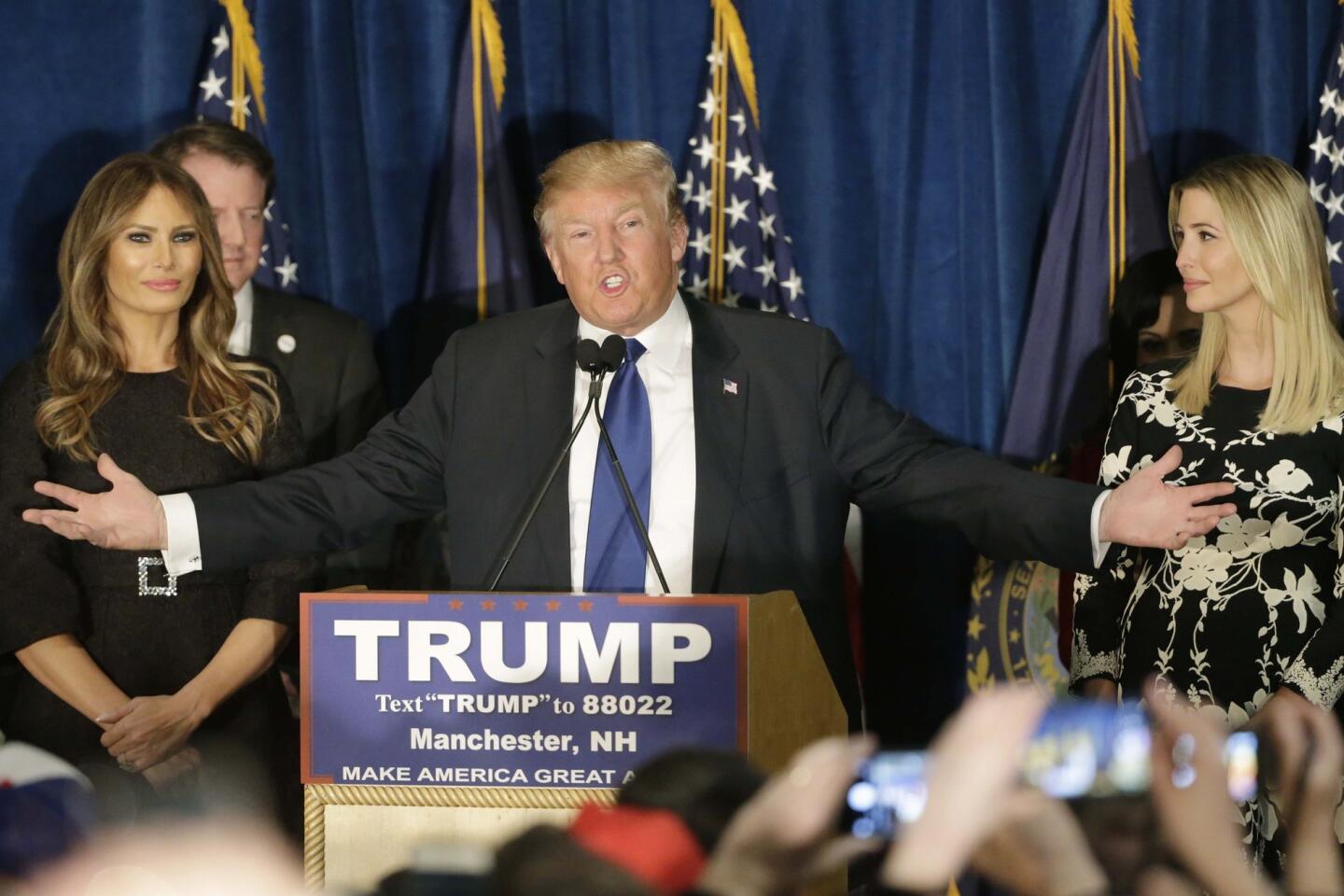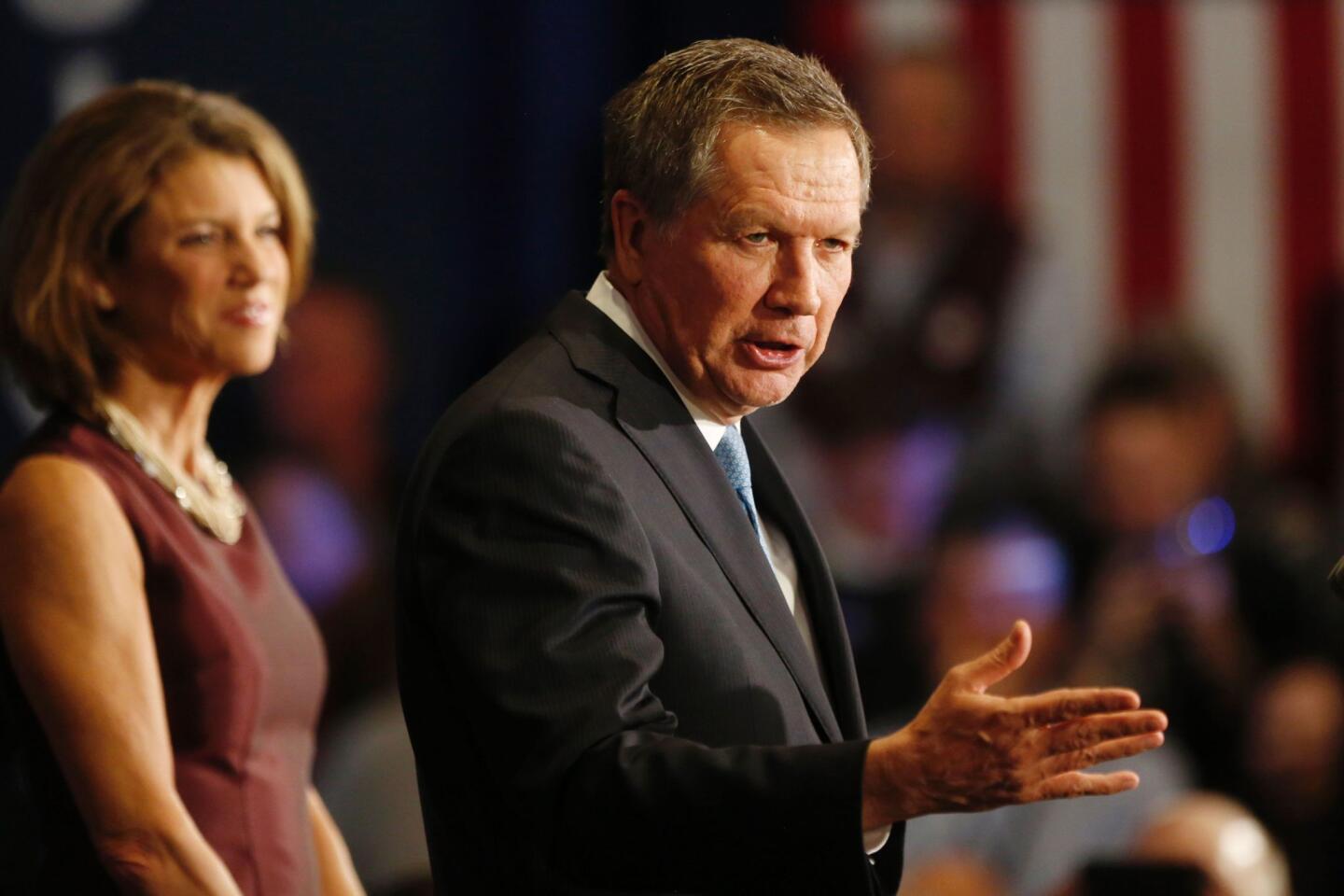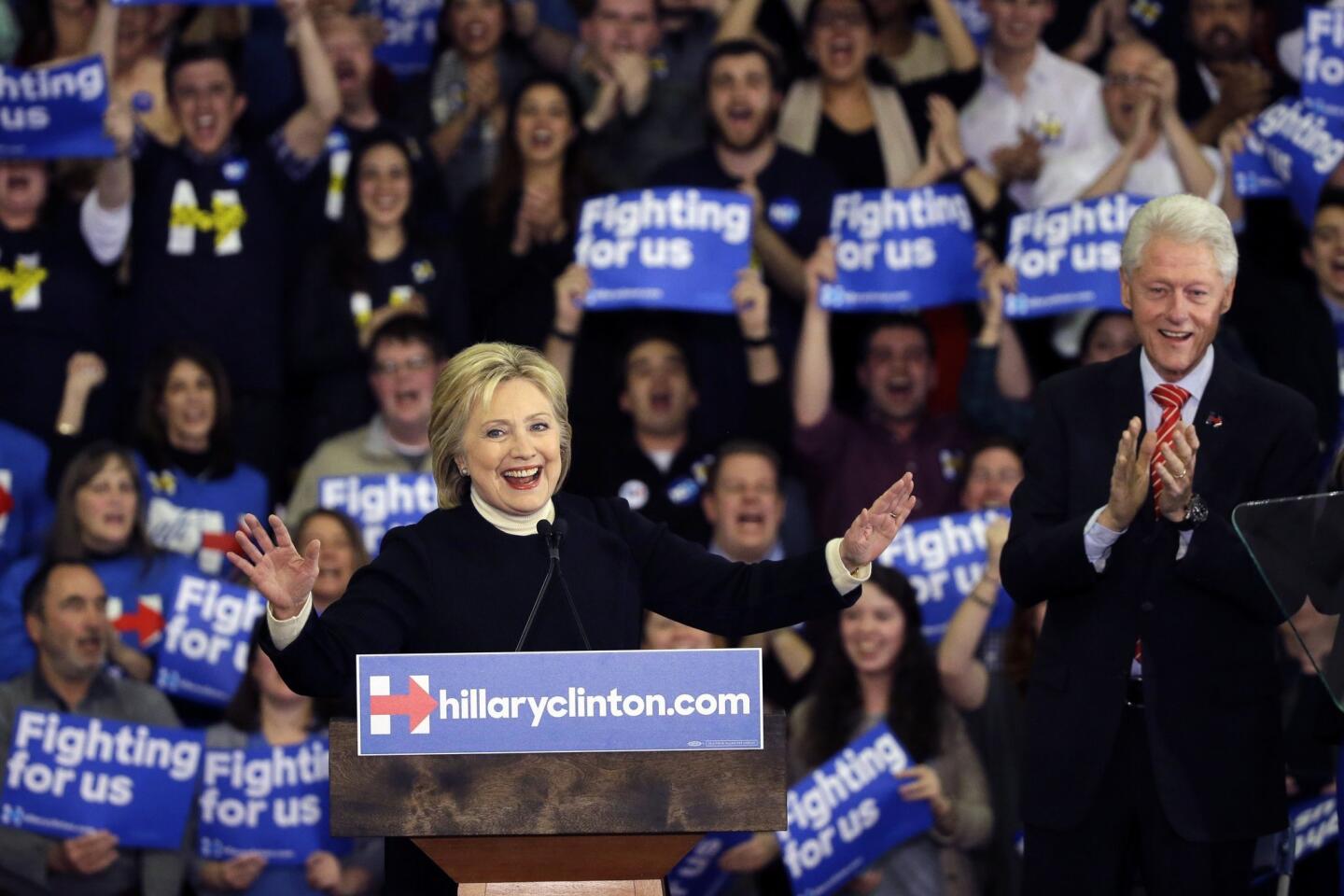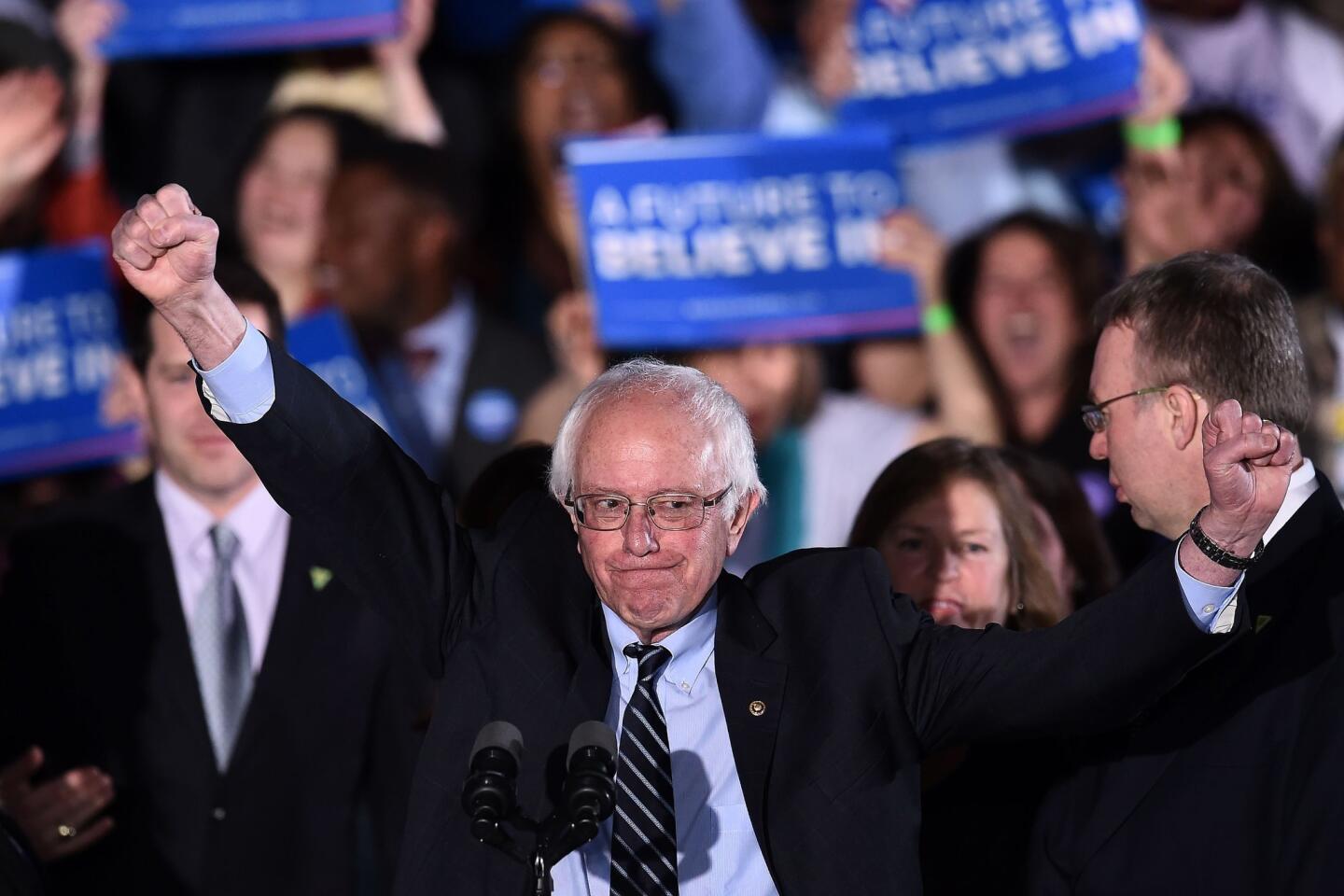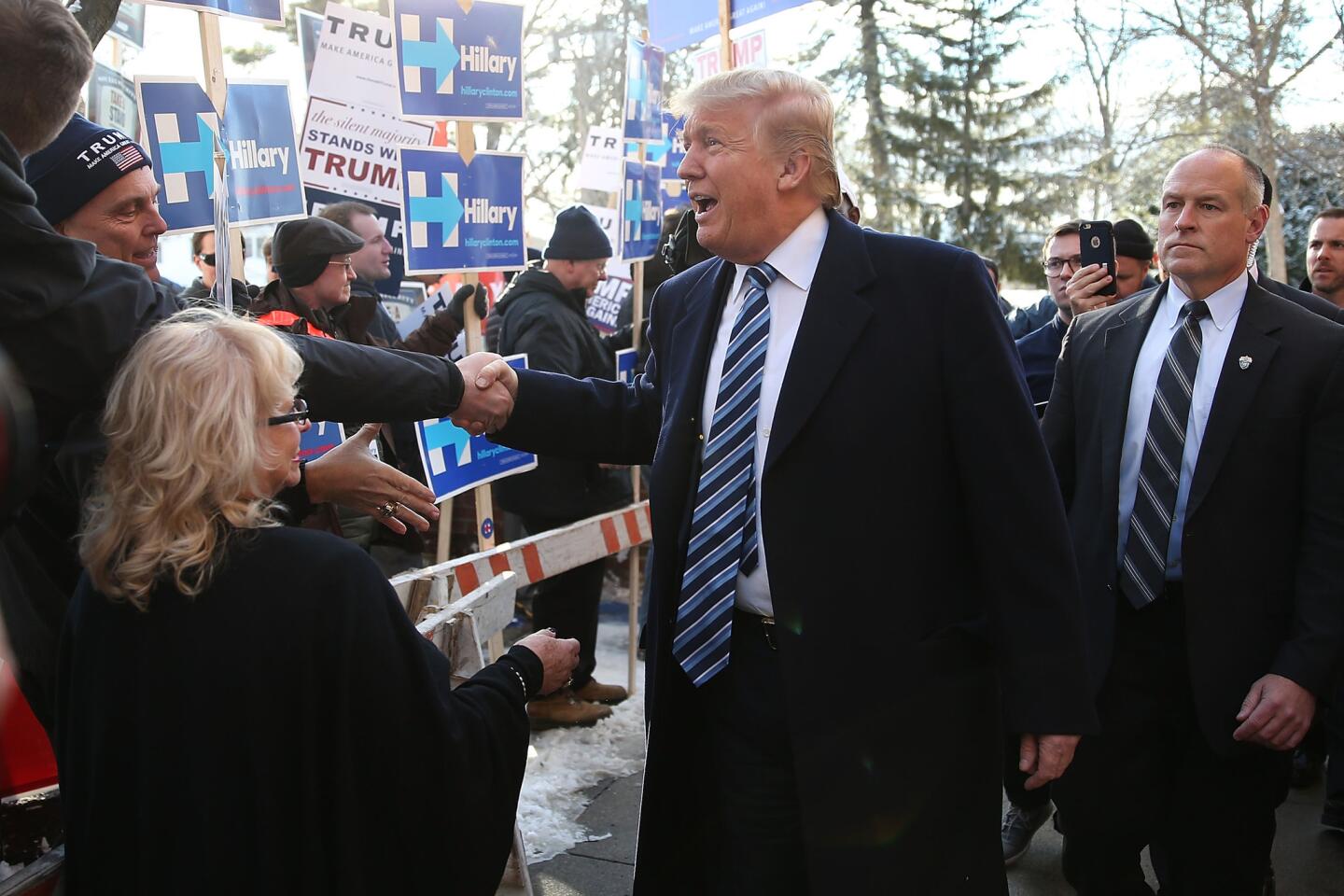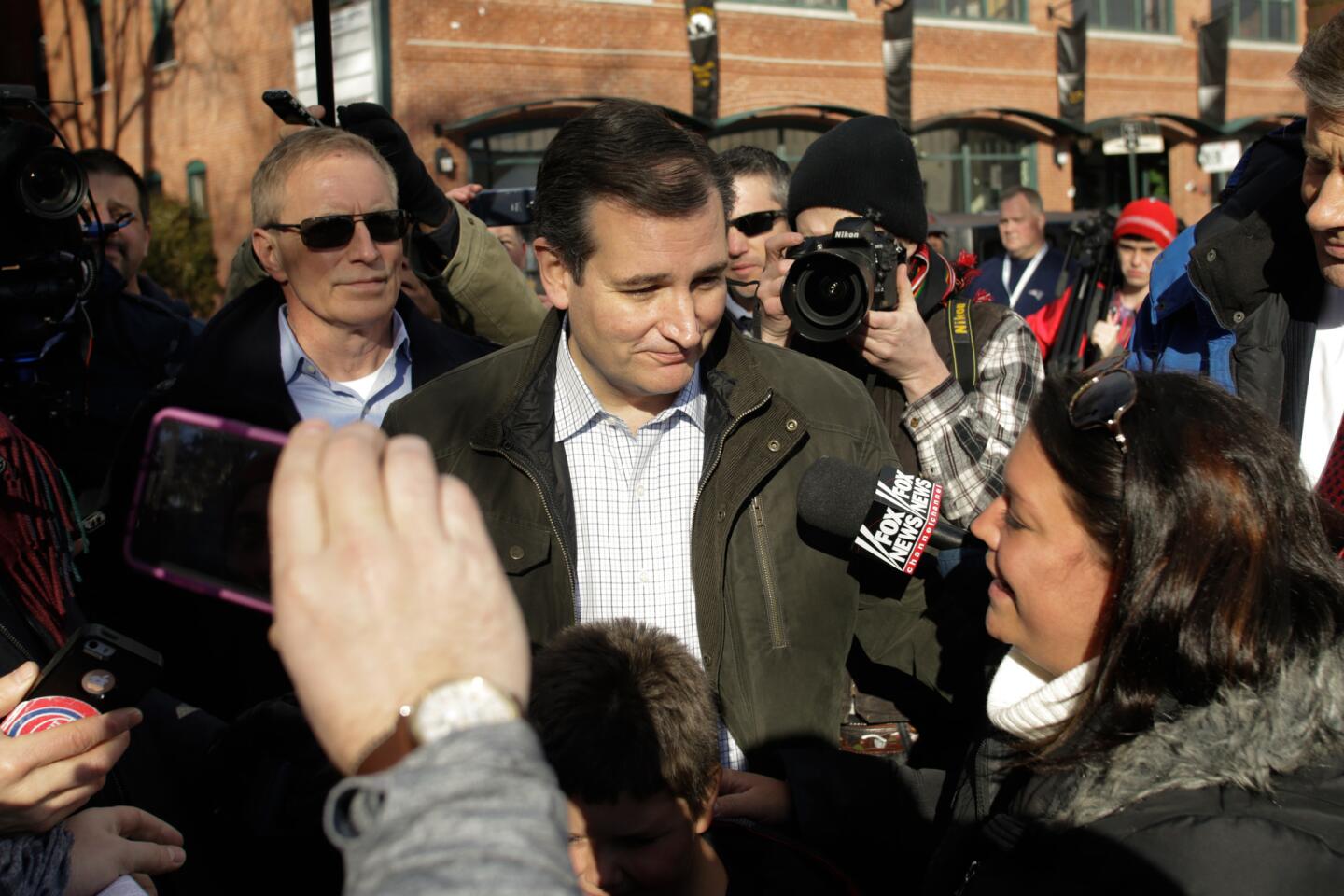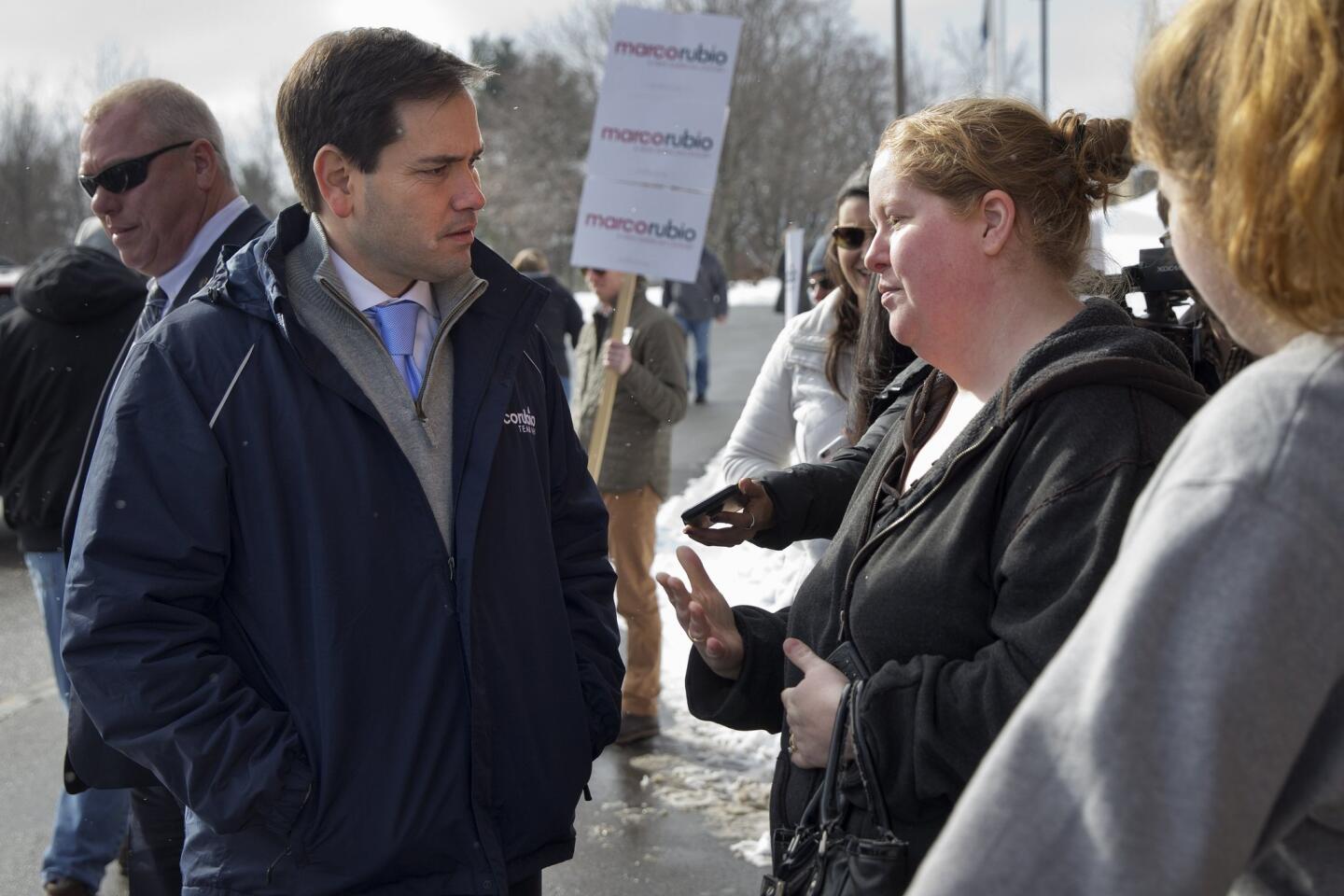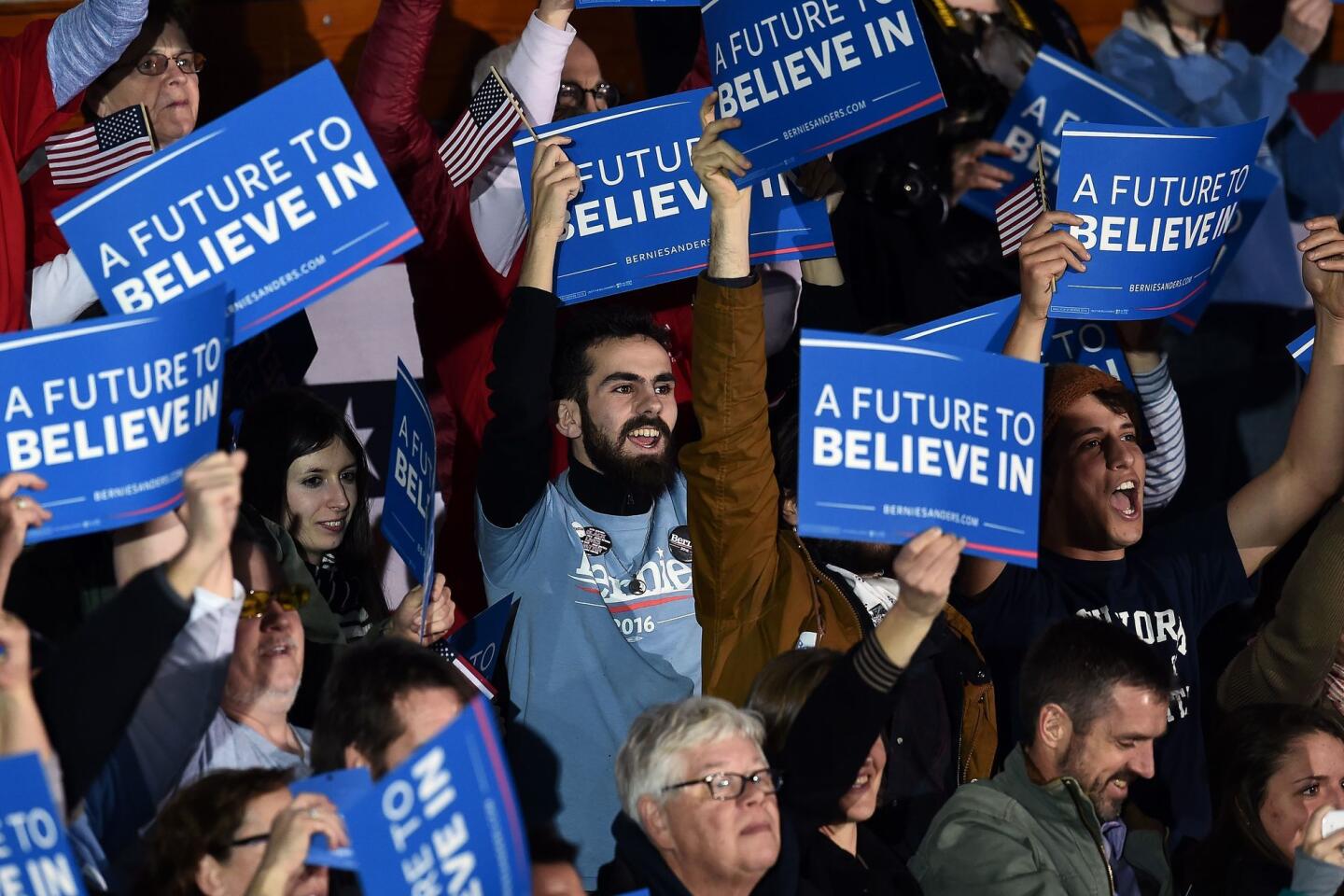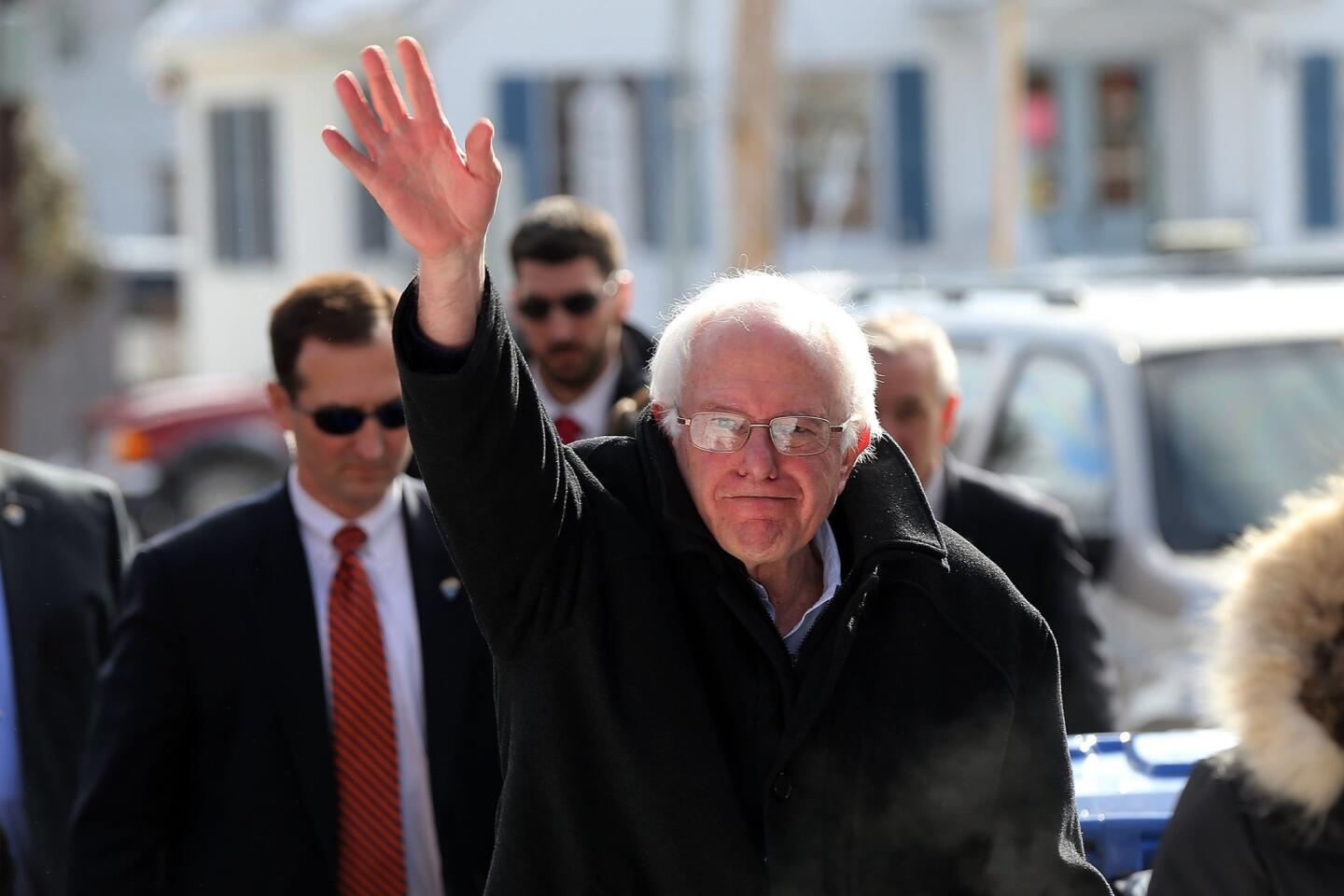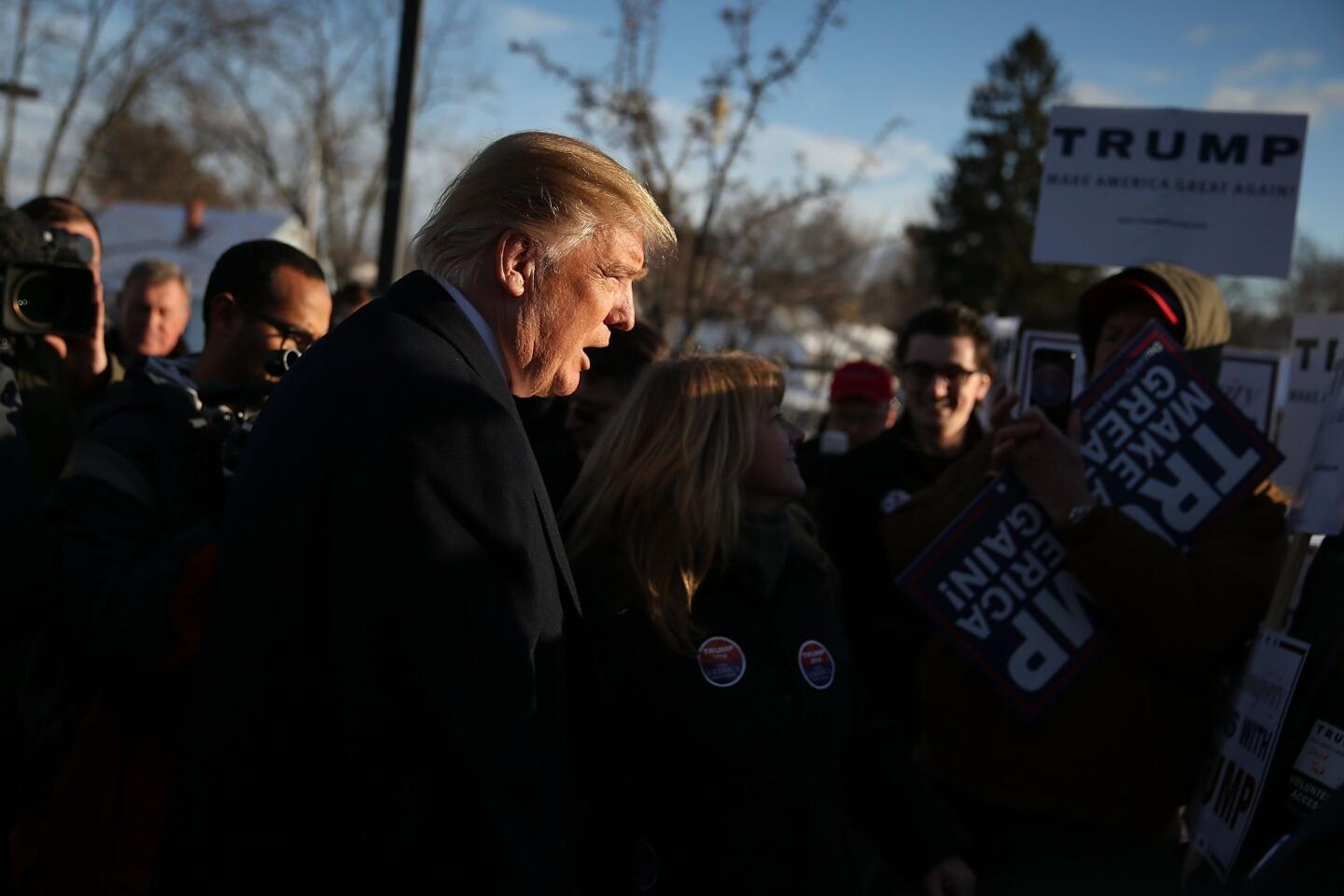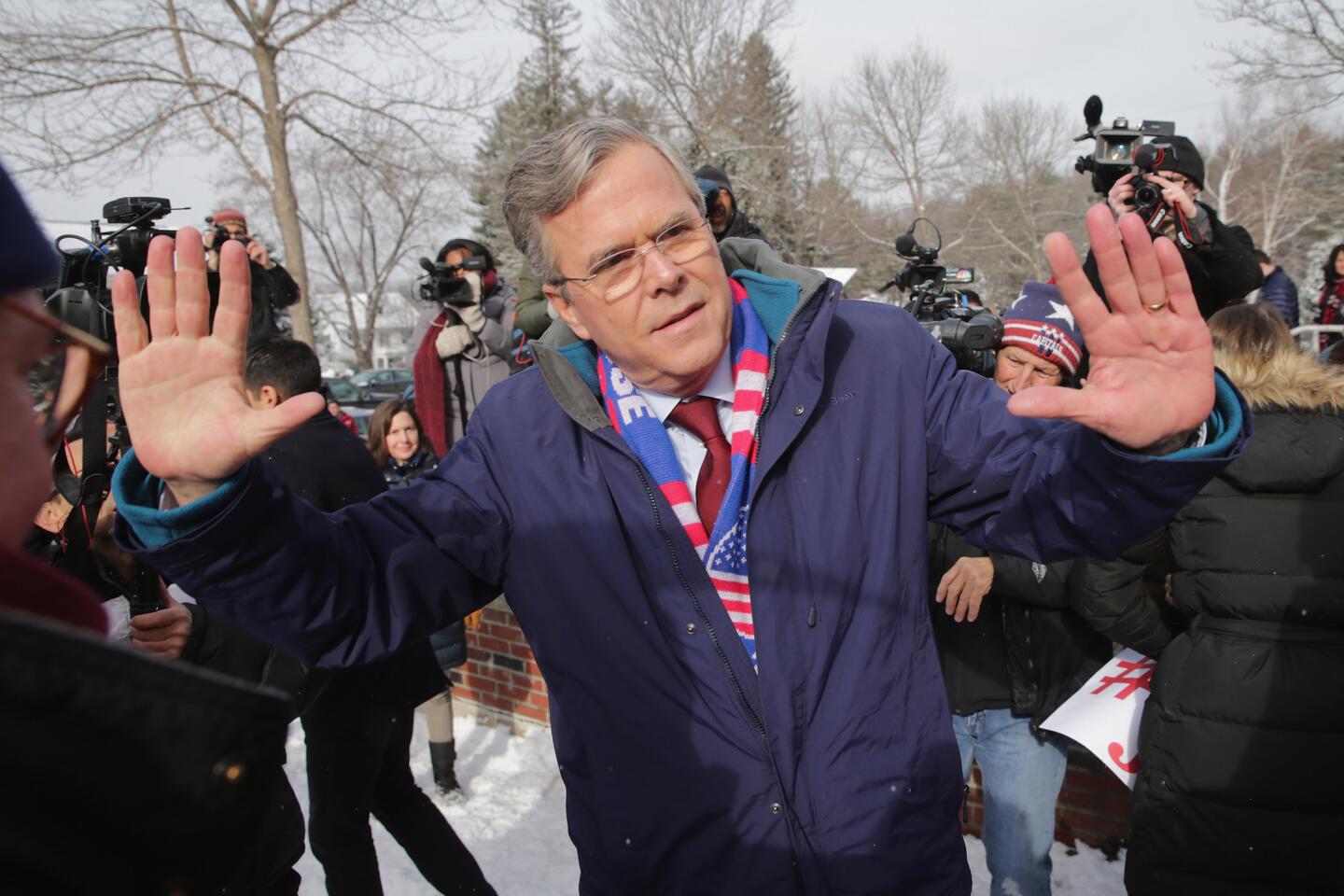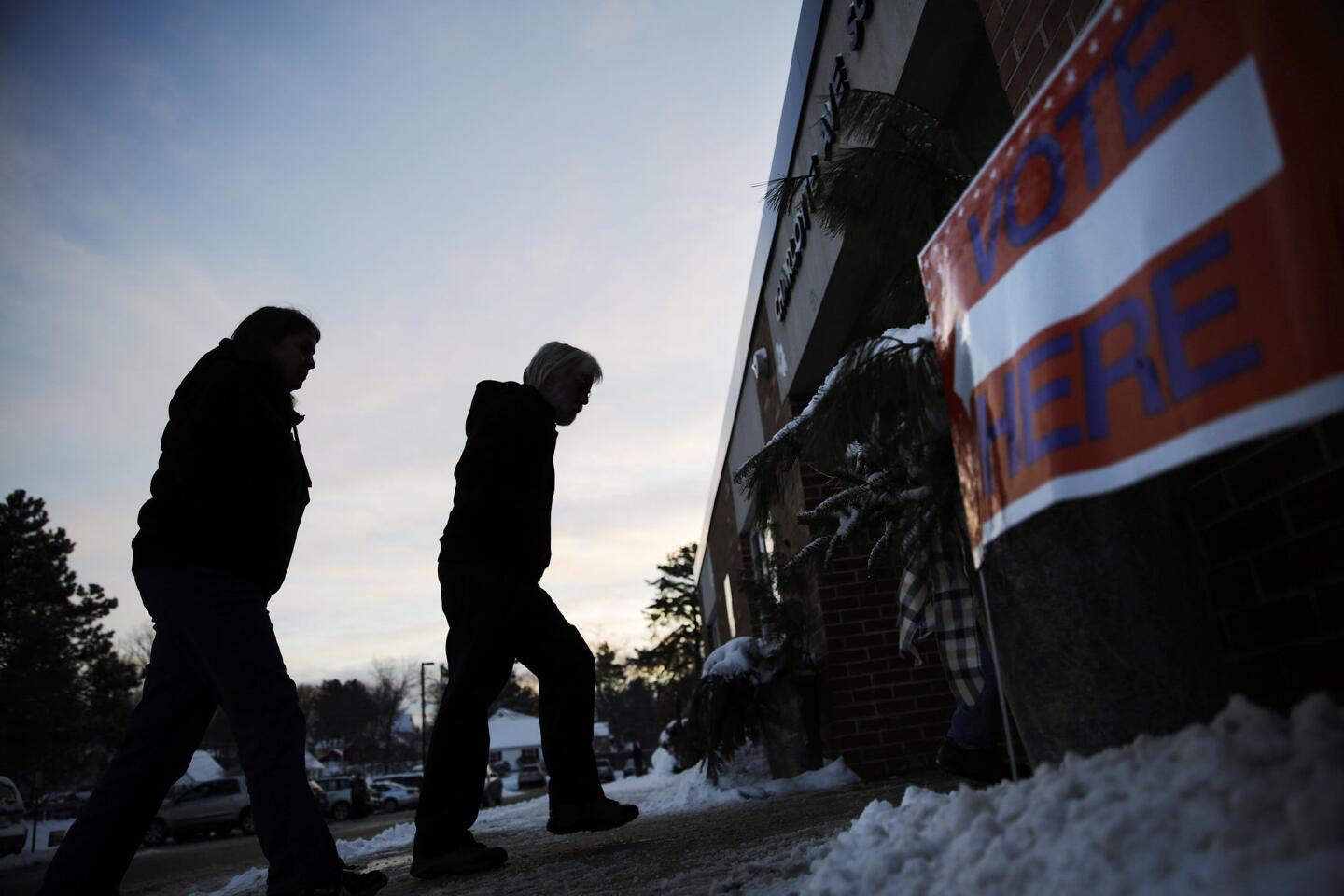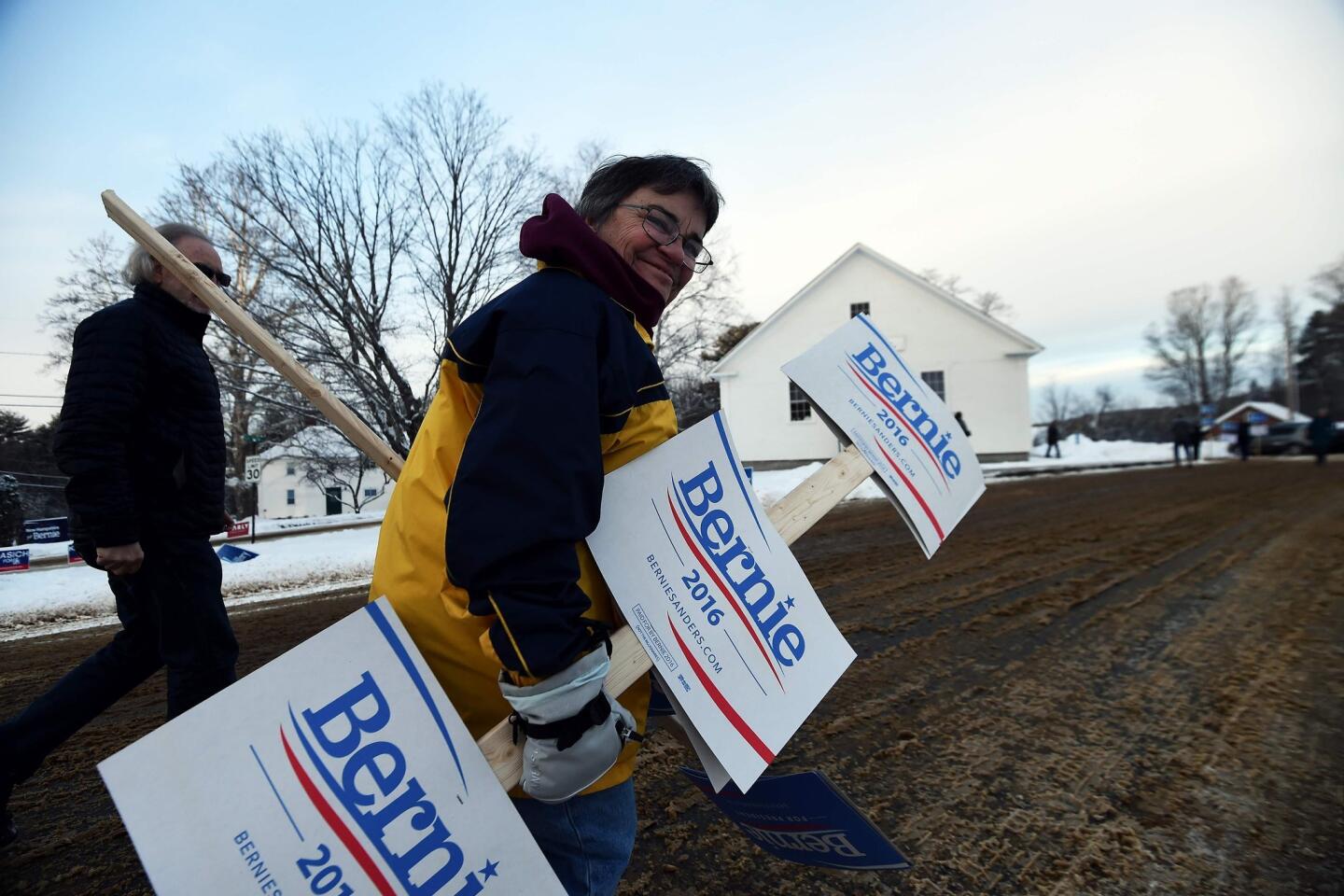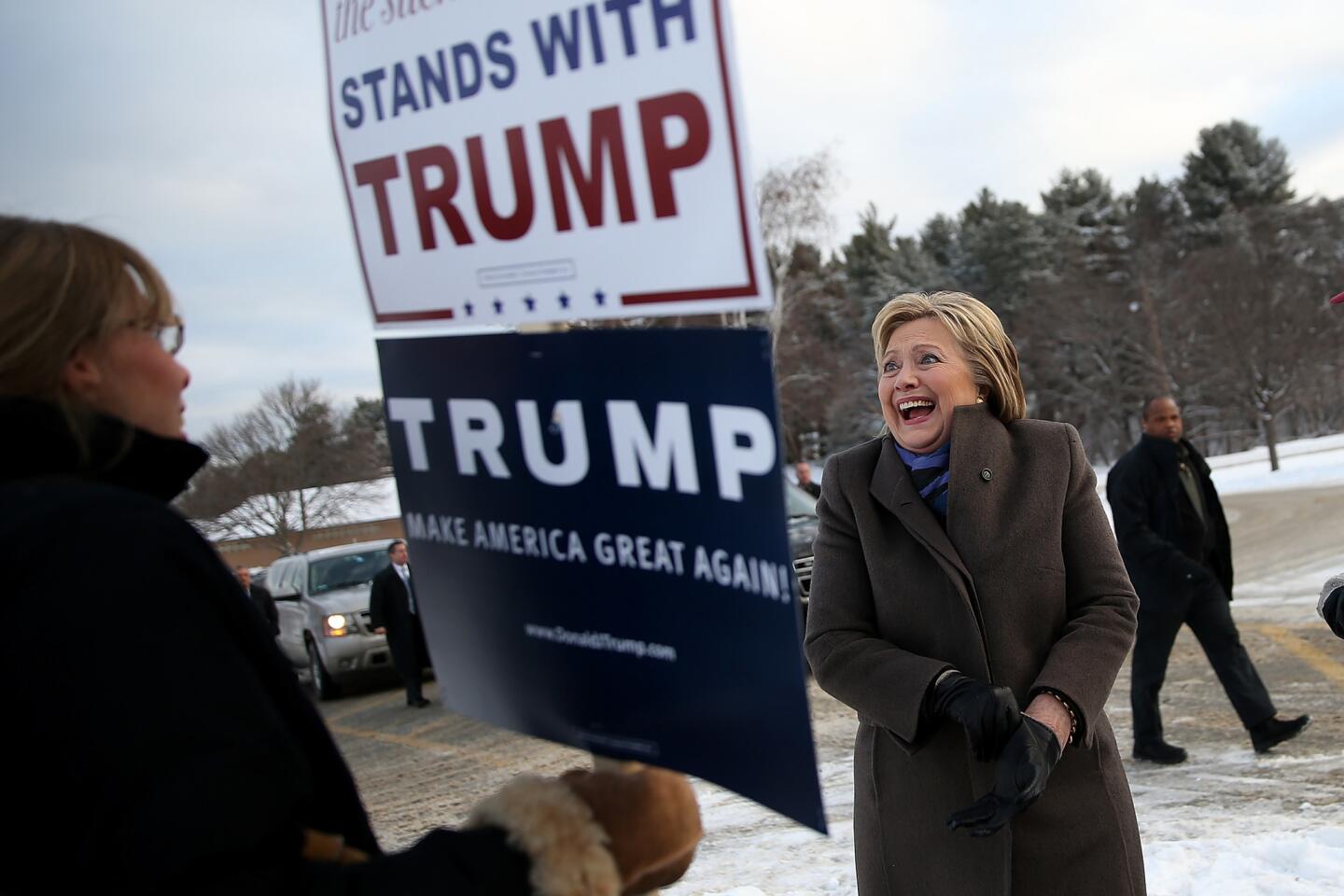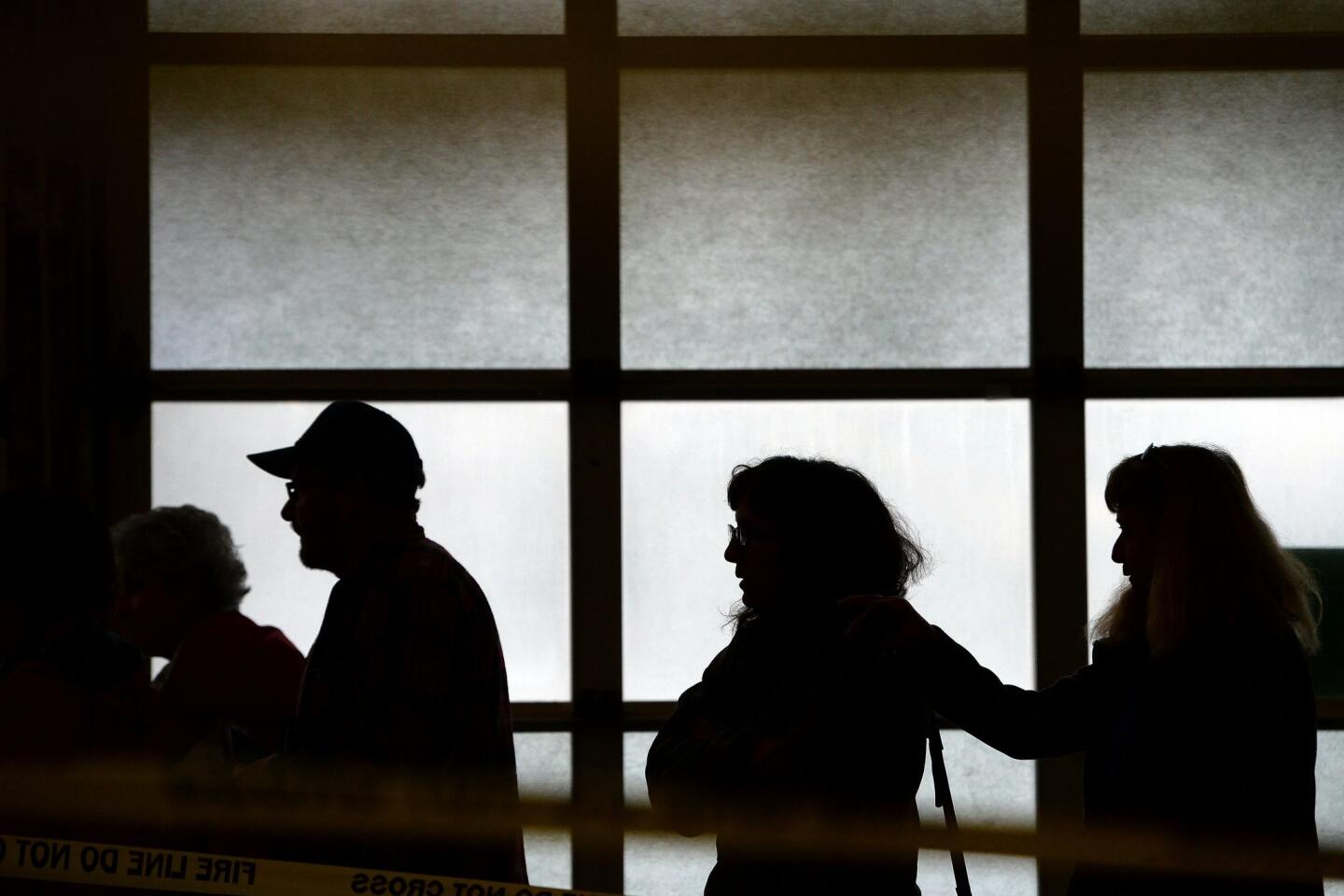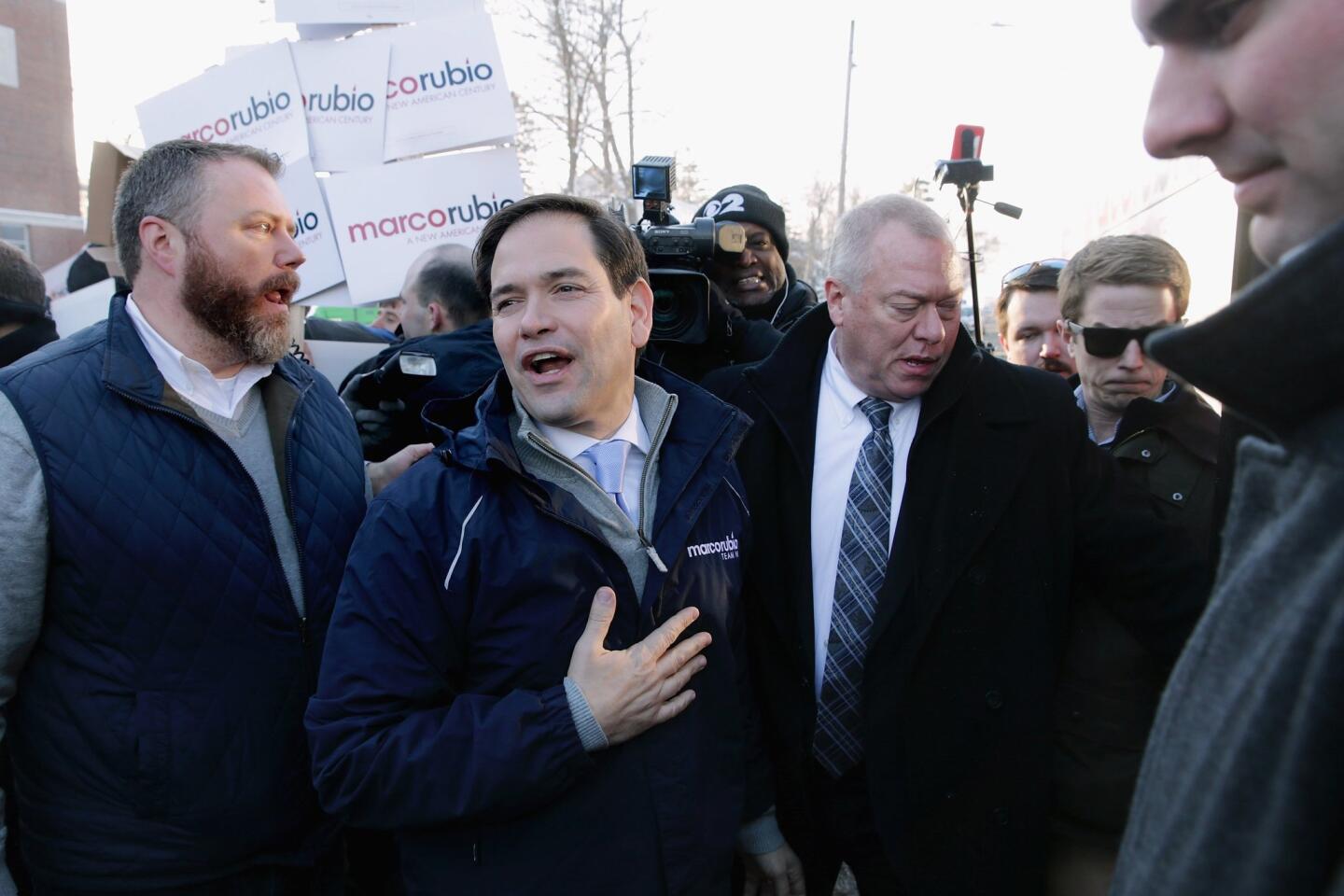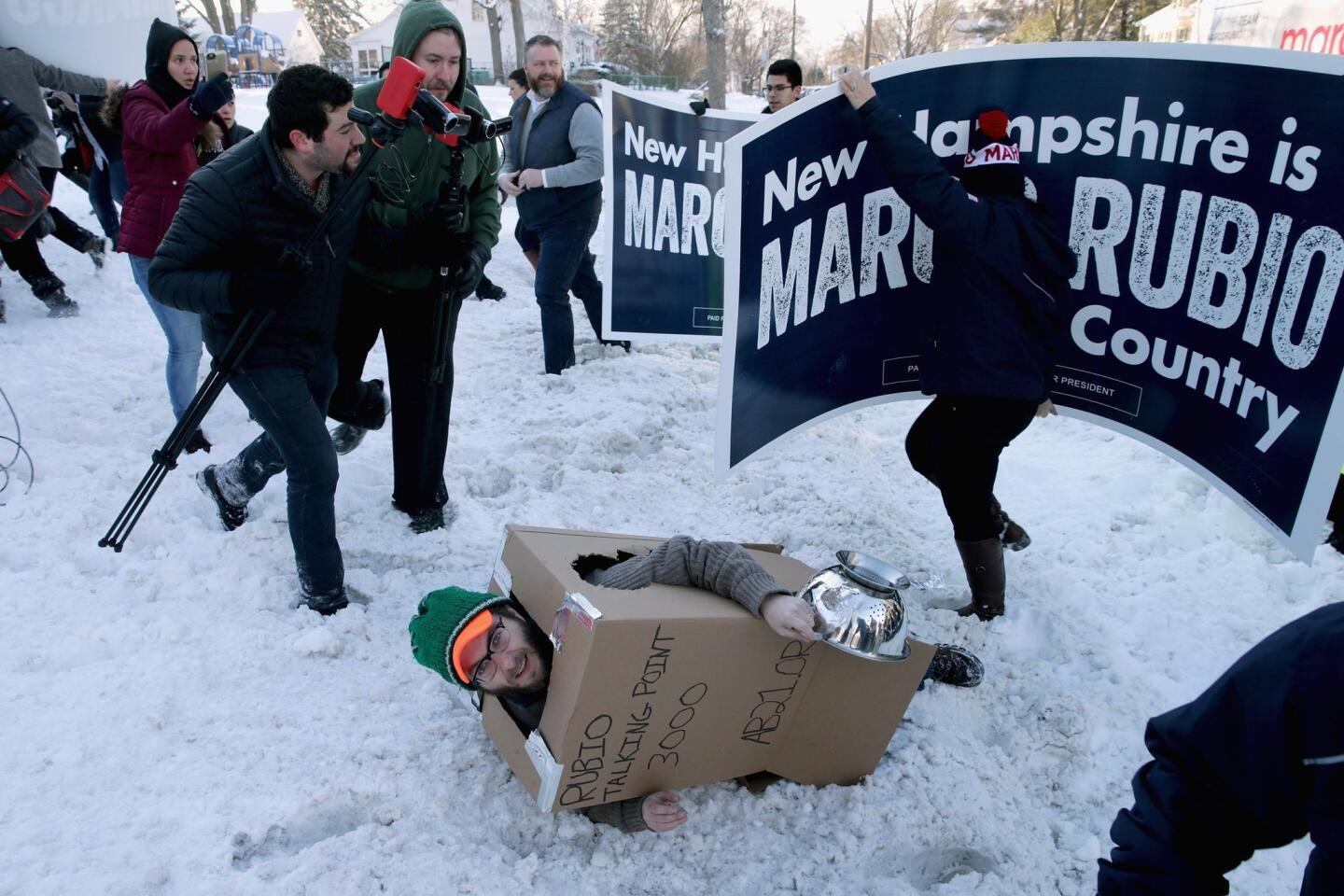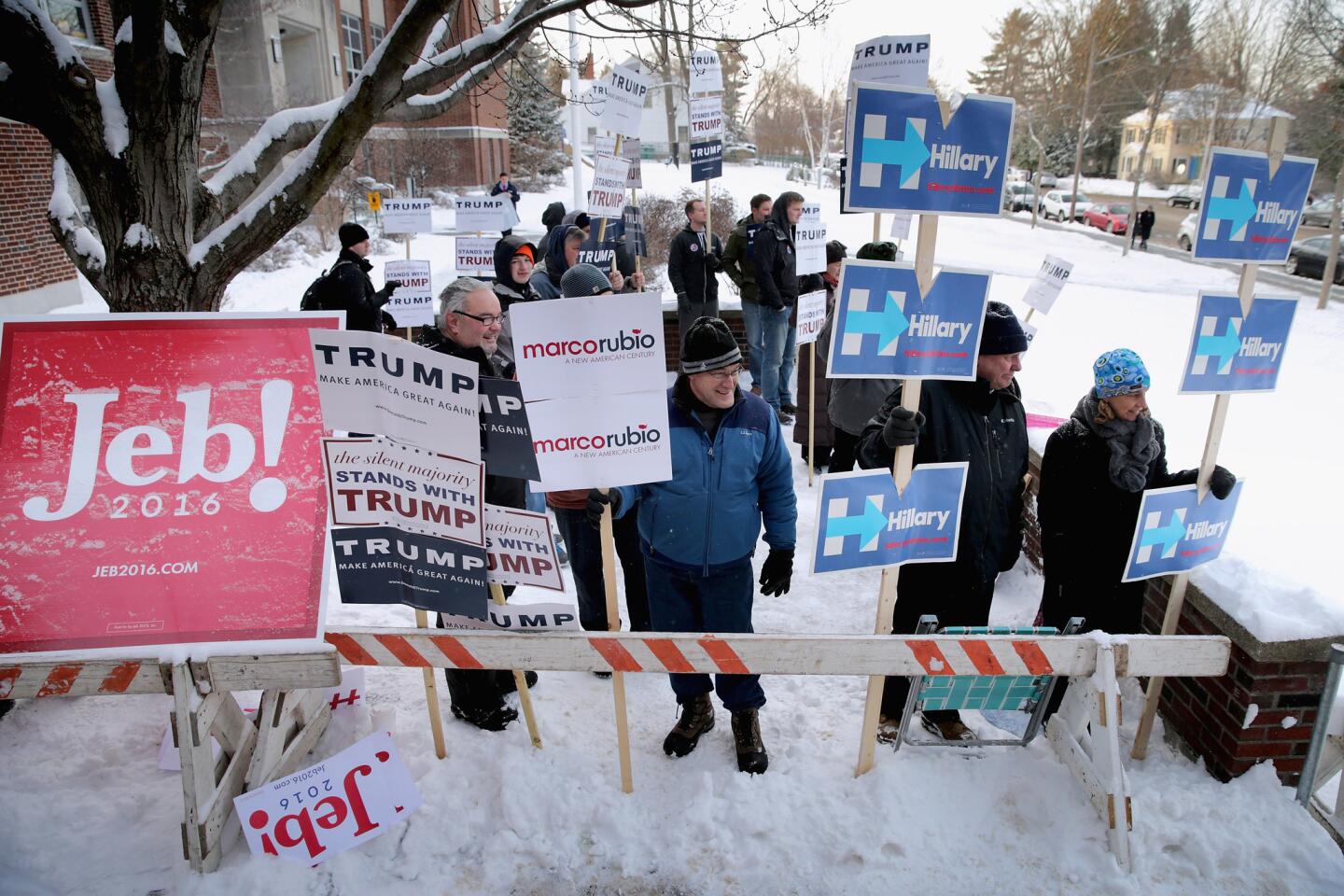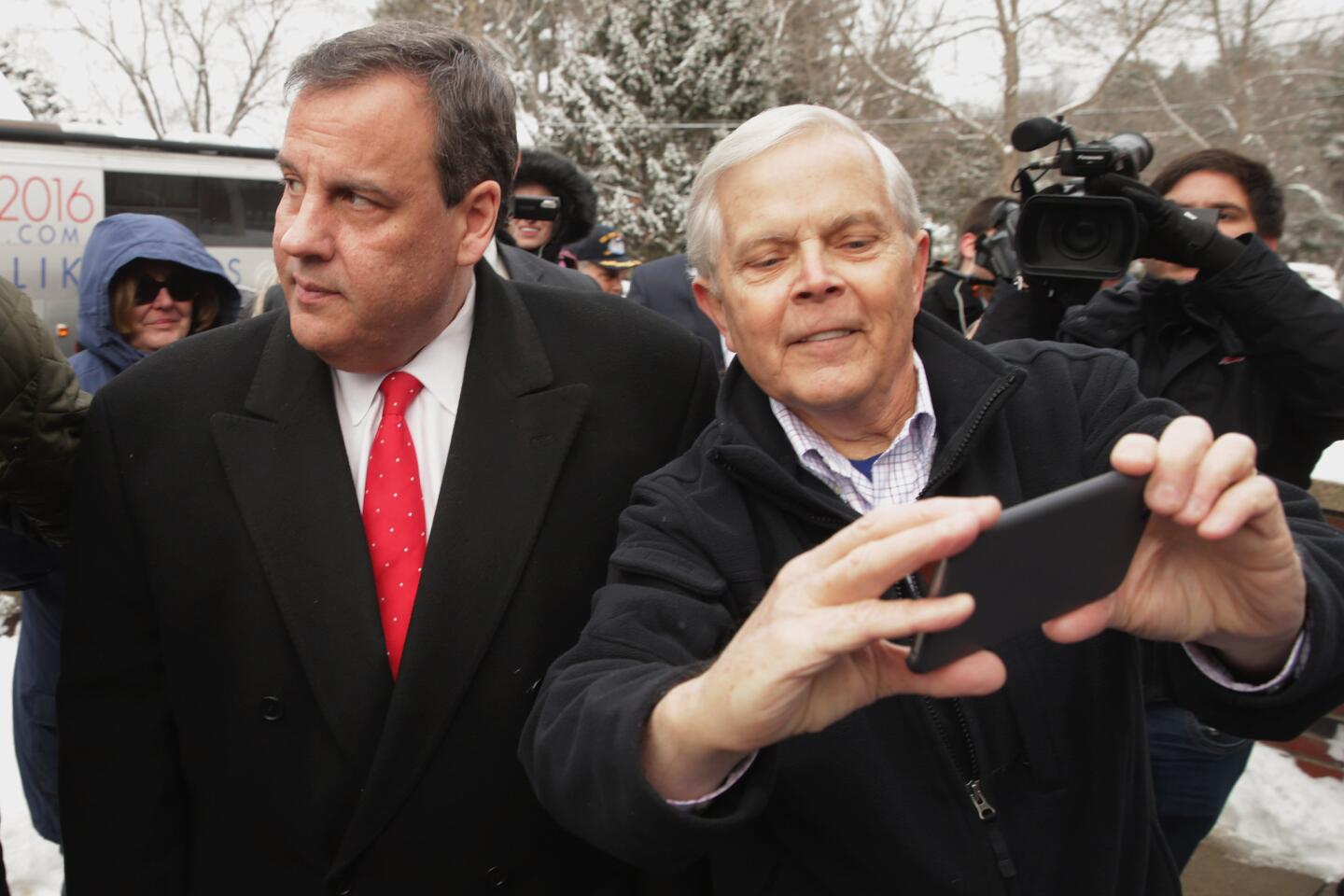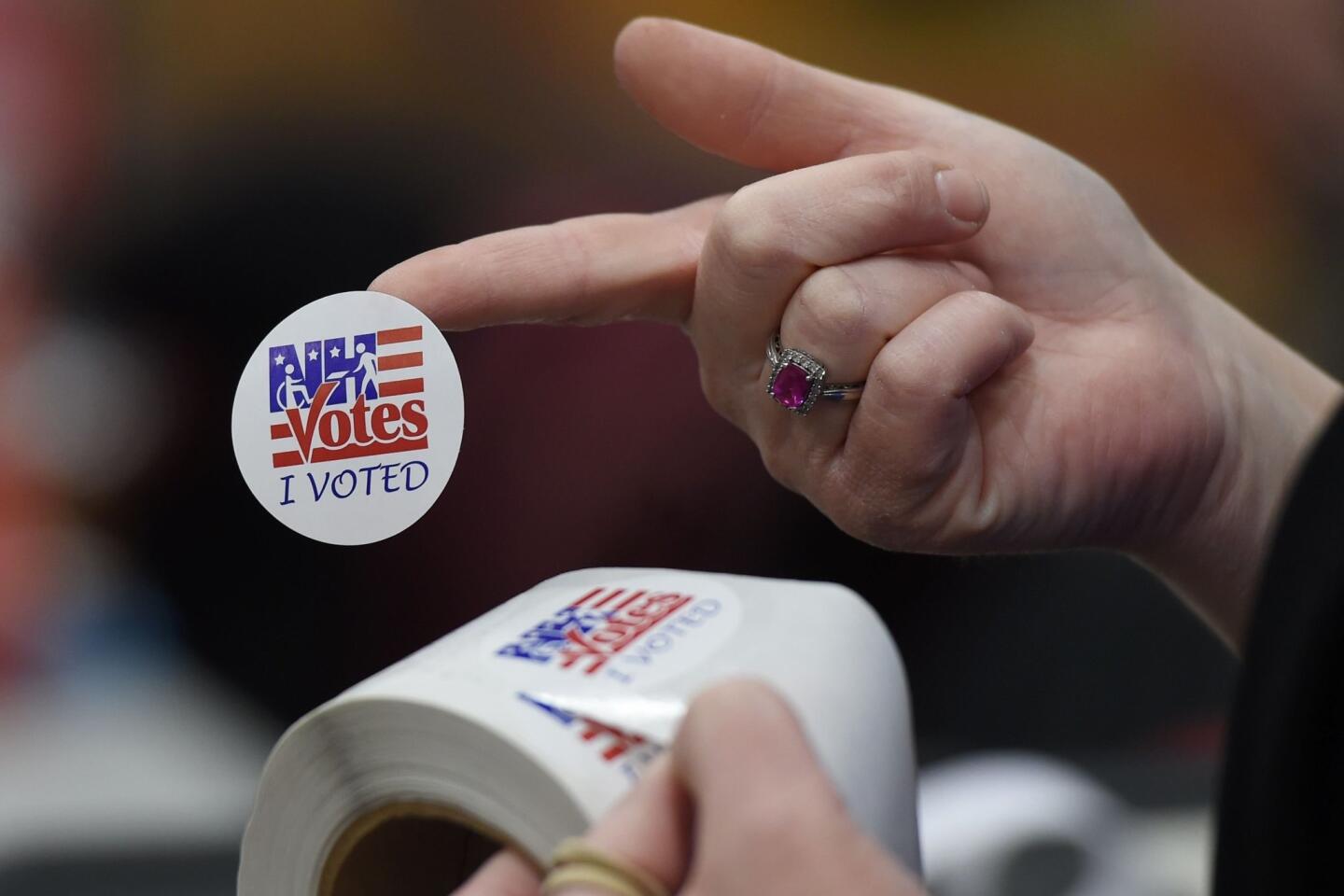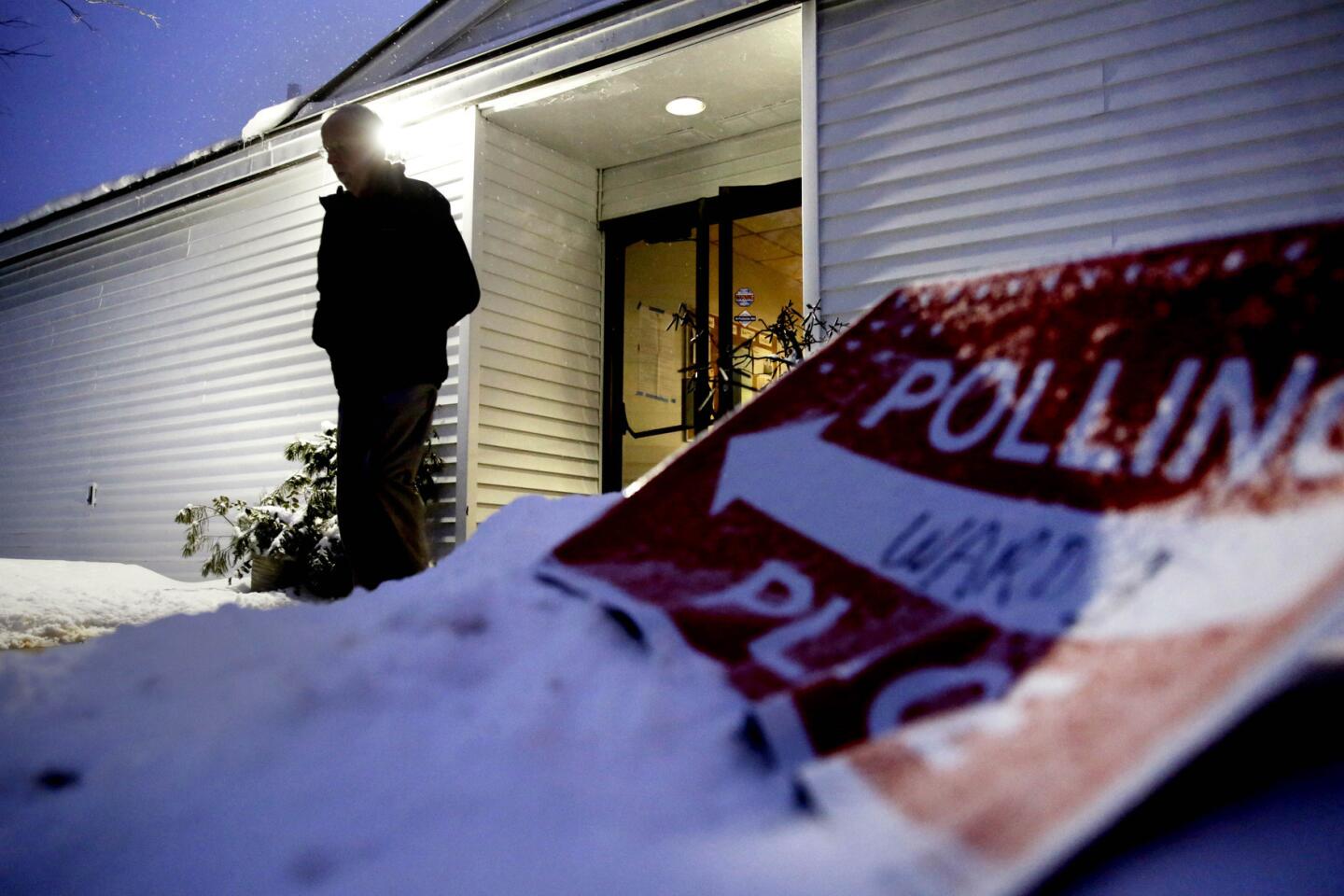Sanders routs Clinton in New Hampshire; campaign moves to South Carolina and Nevada
- Share via
Reporting from Bedford, N.H. — Sen. Bernie Sanders and Hillary Clinton moved quickly Tuesday night to prepare to fight on new terrain in the crucial next round of contests after Sanders delivered a once-unthinkable defeat to the former secretary of State.
The decisive New Hampshire victory for Sanders — with most votes counted, he was taking about 60% — came as exit polls showed his message connecting with large portions of the state’s electorate, particularly young voters and independents, reflecting an appeal that has spread beyond the liberal college-town activists who dominated the crowds at his early rallies.
Clinton is eager to blunt that momentum, and is already looking toward states with more hospitable electoral terrain. Before the polls had even closed in New Hampshire, her aides had sent the media a memo drafted by campaign manager Robby Mook that highlighted how her popularity with minorities positions her to win the delegate-rich large states with big urban populations, such as Texas, Illinois and Florida, that will vote in March.
Before those states get their say, Clinton’s appeal with minority voters will be tested in Nevada and South Carolina, which both vote in the next few weeks. Sanders has already begun working to erode a lead in those states that Clinton aides had hoped would be insurmountable.
Sanders, who has begun to outpace Clinton in fundraising, has invested millions of dollars more in television advertising nationwide and is now the only major political advertiser in Nevada, according to a count by NBC News and SMG Delta, an ad-tracking firm.
“What happened here in New Hampshire in terms of an enthusiastic and aroused electorate, people who came out in large numbers — that is what will happen all over this country,” Sanders, a U.S. senator from neighboring Vermont, said in his victory speech.
The New Hampshire win positions him to step up the pace of his fundraising even more, as the small-dollar donors that fuel his campaign are energized by it. On Tuesday, Sanders didn’t wait to finish his victory speech to slip in a pitch. “I’m going to New York tomorrow, but I’m not going to hold a fundraiser on Wall Street,” he said. “I’m going to hold a fundraiser right here and right now.”
The New York trip, actually, is aimed at jump-starting an aggressive outreach effort by Sanders to minorities. His first meeting is a high-profile breakfast with civil rights leader Al Sharpton.
Despite the win in New Hampshire, Sanders still remains an underdog in the campaign. More than two-thirds of Democrats expect Clinton to be the nominee, according to a new poll for NBC conducted by SurveyMonkey.
And Sanders in his speech issued a call — unusual for a challenger in his position — for party unity, pointedly noting that his words were aimed at his supporters as well as Clinton’s.
“We need to come together in a few months and unite this party,” he said. “Because the right-wing Republicans we oppose must not be allowed to gain the presidency.”
Clinton gave a brief concession speech, following the bitter loss Tuesday in a state that twice before has been the staging ground for political comebacks for her and her husband.
“Now we take this campaign to the entire country,” she said. “We are going to fight for every vote in every state.”
Clinton had a message to voters in the next states to vote: “People have every right to be angry,” she said. “But they are also hungry. They are hungry for solutions. That is the fight we are taking to the country.”
Clinton campaign operatives are eager to turn the page on New Hampshire; the result here, they insist, is relatively inconsequential to their larger effort.
“It will be very difficult, if not impossible, for a Democrat to win the nomination without strong levels of support among African American and Hispanic voters,” Mook wrote in his memo. “We believe that’s how it should be.”
Sanders does not currently have that support. Clinton does.
Still, the New Hampshire loss has the Clinton campaign reconsidering its approach.
The voting came after an aggressive, last-minute push for her by former President Clinton, the prodding of young women voters by feminist leader Gloria Steinem and former Secretary of State Madeleine Albright, and appeals from the state’s popular governor and Democratic U.S. senator. None of that appeared to have done much to get Sanders supporters to reconsider. Indeed, some comments by Clinton’s supporters may have backfired.
While voters descended on polling places, questions about a possible shake-up of Clinton’s staff hovered over her campaign. Clinton and her campaign chairman, John Podesta, denied media reports suggesting heads would roll. But the candidate also said that after the New Hampshire results were in, her campaign would be “taking stock” of its strategy and reassessing where it might improve.
Exit polls, meanwhile, revealed some troubling trends for Clinton, most notably her dismal standing with the youth vote, which Sanders dominated. About 8 in 10 voters under 30 cast ballots for Sanders.
More than two-thirds of voters in the Democratic primary called themselves “liberal” or “very liberal,” with about one-quarter saying “very liberal.” Those shares were up significantly compared with 2008, reflecting a Democratic Party that has moved to the left.
One-third of primary voters said Clinton is not liberal enough, while just over half said she is about right on the issues. About one-quarter said Sanders was too liberal, but about 7 in 10 said his issue positions were about right.
Nine in 10 said the U.S. economic system generally favors the wealthy — one of Sanders’ key arguments. Two-thirds said they support a single-payer healthcare system, and about one-third said income inequality was the most important issue to them. Sanders beat Clinton handily among that group.
Clinton beat Sanders on the question of who would best handle an international crisis.
Tuesday’s voters said they cared most about having a candidate who agreed with them. Only about 1 in 10 said “electability” was the most important attribute in a presidential candidate.
In his speech, Sanders hailed the large turnout in the state, saying it reflected the “excitement that the Democratic Party will need to succeed in November.”
And, indeed, many voters interviewed here said they had been drawn to vote for the first time by Sanders.
“I think he’s doing fantastic,” said Tom Estabrook, 64, pointing to a queue of new and undeclared voters snaking all the way down a hallway at Bedford High School, waiting as long as an hour to register.
“Look at the line for people registering to vote. It’s fantastic. It is a lot of young people.”
In interviews, new voters said they had made up their minds weeks ago, and their resolve had only intensified as the Clinton campaign aggressively sought to raise doubts about Sanders’ qualifications and campaign tactics.
“All the other candidates, I don’t see them to be fit to be president,” said Sanders supporter James Frain, a 20-year-old who was voting for the first time.
Sanders spent the final days on the campaign trail here in an uncharacteristically disciplined fashion, sticking to the same stump speech he has delivered for months and avoiding impromptu moments with reporters that risked drawing him into a tit-for-tat with the former president or other Clinton allies who had criticized him in recent days.
The cheerful mood did not mean, however, that Sanders had mellowed. When a reporter asked what he had for breakfast, he responded characteristically.
“You think that is one of the major issues facing the American people?”
Times staff writer David Lauter in Washington contributed to this report.
ALSO:
Full New Hampshire primary results
Live coverage from New Hampshire on Trail Guide
Will voters clarify or further complicate a crowded GOP race?
Californians cross the country to get a glimpse of presidential candidates
More to Read
Get the L.A. Times Politics newsletter
Deeply reported insights into legislation, politics and policy from Sacramento, Washington and beyond. In your inbox twice per week.
You may occasionally receive promotional content from the Los Angeles Times.
